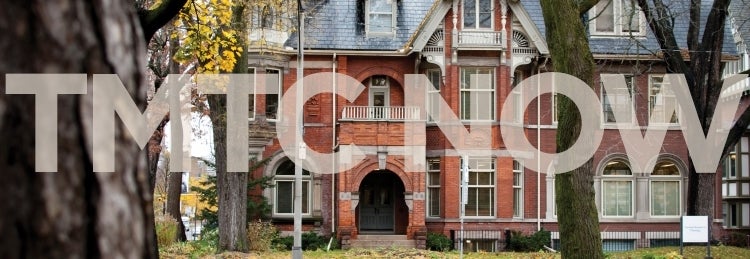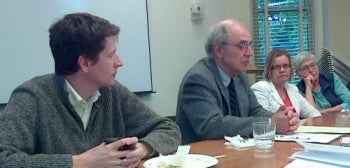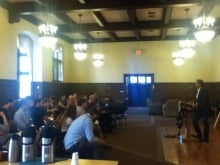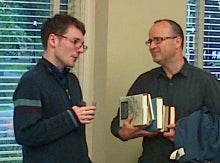
Editorial
By John Rempel, TMTC director
 The longer I am at TMTC and TST the more confident I am that its vision is worth striving for! The original vision was twofold. One was academic. It was crucial for a Mennonite theology professor to be here to teach, to develop solid working relationships with colleagues, and to be a member of comprehensive exam and thesis committees. The second part of the vision was communal. Mennonite doctoral students had been coming to the theological colleges associated with the University of Toronto since the late 1960s. The ecumenical education they received enriched them and the institutions at which they taught. But it lacked a Mennonite and Free Church reference point – where the particular concerns of these traditions had a place and where they could be explored in courses. Jim Reimer, Lydia Harder, and a series of outstanding graduate assistants made this vision happen.
The longer I am at TMTC and TST the more confident I am that its vision is worth striving for! The original vision was twofold. One was academic. It was crucial for a Mennonite theology professor to be here to teach, to develop solid working relationships with colleagues, and to be a member of comprehensive exam and thesis committees. The second part of the vision was communal. Mennonite doctoral students had been coming to the theological colleges associated with the University of Toronto since the late 1960s. The ecumenical education they received enriched them and the institutions at which they taught. But it lacked a Mennonite and Free Church reference point – where the particular concerns of these traditions had a place and where they could be explored in courses. Jim Reimer, Lydia Harder, and a series of outstanding graduate assistants made this vision happen.
As I see it TMTC’s mandate is as full of potential as ever. Our challenge is to make this known to Mennonite and related students across Canada and the United States and beyond. It is no small matter that the Ontario government makes graduate education in theology affordable, even for international students. When you combine that advantage with a consortium of theological colleges that includes a Mennonite Centre associated with a cosmopolitan university reasons for coming to TST are amazing. We need to find ways to bring this opportunity to the attention of more people considering graduate theological education. And their mentors.
We know that teaching positions in the humanities, including religion, philosophy, and history, have many more applicants than openings. We know that the concerns of spouses and children make it harder for families to relocate. None of that lessens the need for broadly educated students who can interpret a Christian worldview in relation to the profound struggles of our day for peace and justice. Finally, Mennonites and other Free Churches have a part to play along with other churches in developing new models of faithfulness for the church.
Next year marks the 25th anniversary of Toronto Mennonite Theological Centre. It will be an exciting opportunity to review the past as well as to innovate for the future. In the spring of 2015 I will complete my third and final year as TMTC director. They have been stimulating and fruitful years but I am now ready for the less structured life of retirement. I do look forward to a continuing association with the people connected with TMTC. I’m enormously grateful that our sponsor, Conrad Grebel University College, is already engaged in a search for my successor (see link to notice in this issue).
Upcoming Courses with John Rempel:
Winter 2015 - “Theologizing in the Anabaptist Mennonite Tradition”
A survey of the development of Mennonite thought from the 16th through the 20th centuries. It will focus largely on primary sources: theological texts, catechisms, confessions of faith, spiritual writings, and memoirs to critically examine continuities and discontinuities in Mennonite belief and practice across the centuries.
Toronto School of Theology, Winter Term Course 2015, Thursdays 9:00 - 11:00 beginning January 8. TST students enroll through your college. Auditors contact TMTC at mennonite.centre@utoronto.ca / (416) 978-6078
TMTC Graduate Student Conference 2014
By Kimberly Penner
 TMTC held its 6th biennial Graduate Student Conference May 30 – June 1 of 2014. The conference title was: “Wading Deeper: Anabaptist-Mennonite Identities Engage Postmodernity.” It was held in Winnipeg at Canadian Mennonite University and featured the papers of 15 graduate students, artist submissions from four Winnipeg artists, a Mennonite worship service of (postmodern) reading and song, and a keynote presentation from Peter Dula, Professor of Religion and Culture at Eastern Mennonite University. In speaking with the presenters, as well as other conference participants (roughly 30 people in all), many noted the academic caliber of the papers and, in several cases, their relevance for the life of the church. The diversity of institutions represented also stood out with students attending from Toronto School of Theology, Conrad Grebel University College, Canadian Mennonite University, Chicago Theological Seminary, Claremont School of Theology, Baylor University, Anabaptist Mennonite Biblical Seminary, Princeton Theological Seminary, University of Florida, Yale Divinity School, and Notre Dame.
TMTC held its 6th biennial Graduate Student Conference May 30 – June 1 of 2014. The conference title was: “Wading Deeper: Anabaptist-Mennonite Identities Engage Postmodernity.” It was held in Winnipeg at Canadian Mennonite University and featured the papers of 15 graduate students, artist submissions from four Winnipeg artists, a Mennonite worship service of (postmodern) reading and song, and a keynote presentation from Peter Dula, Professor of Religion and Culture at Eastern Mennonite University. In speaking with the presenters, as well as other conference participants (roughly 30 people in all), many noted the academic caliber of the papers and, in several cases, their relevance for the life of the church. The diversity of institutions represented also stood out with students attending from Toronto School of Theology, Conrad Grebel University College, Canadian Mennonite University, Chicago Theological Seminary, Claremont School of Theology, Baylor University, Anabaptist Mennonite Biblical Seminary, Princeton Theological Seminary, University of Florida, Yale Divinity School, and Notre Dame.
TMTC Graduate Student Conference: The Ethics of Mennonite Theologizing
By Susanne Guenther Loewen
According to Mennonite theologian J. Denny Weaver, it is only in the past several decades that Mennonites have “become comfortable talking about theology as theology.”[1] If that is the case, then last summer’s TMTC Graduate Student Conference, “Wading Deeper: Anabaptist-Mennonite Identities Engage Postmodernity,” proves that Mennonite theology is now coming into its own, confidently wading into a rich variety of theological topics and perspectives.
Despite the unmoored hyper-intellectualism that postmodernity can sometimes engender, I perceived a kind of earthiness in these presentations – a Mennonite groundedness in ethics and faith-as-praxis. This emphasis appeared in places one would expect it – in discussions of Mennonite culture in relation to race and hybrid identities (Philipp Gollner, Justin Heizekehr), explorations of Mennonite sexualities (Kim Penner, Jason Frey), and calls to ecological/More-with-Less and Indigenous justice (Sarah Werner, Melanie Kampen). But, strikingly, it was also apparent in more systematic topics like Mennonite ontology (Max Kennel), eschatology (Ry Owen Siggelkow), and Christology (Zac Klassen and myself).
This pattern suggests a postmodern sense that Mennonite theologizing itself must be ethical and peaceable if it is to maintain its coherence and credibility, which casts doubt on the ongoing attempts by the academy to divide and subdivide Christian ethics and theology from one another, among other disciplines. But since no signifier is reducible to a single meaning, it also suggests, quite simply, that the future of Mennonite theology is in good hands.
Follow up with Dave Csinos (Reimer Award Winner, 2011)
By Dave Csinos
It was an honour and a privilege to receive the A. James Reimer Award in 2011. This award allowed me to focus on completing my comprehensive exams during the 2011-2012 year, and it helped springboard me to toward my dissertation research, which revolves around a qualitative study of children and culture in the United Church of Canada. This research has connected me with four distinct congregations in southwestern Ontario. During the 2013-2014 academic year, I spent time getting to know each congregation and I sat down to talk with their children, ministers, and lay leaders. I wrapped up this phase of my dissertation research in August 2014, just in time for me to move to Nova Scotia in September, where my wife began her tenure as Minister of Faith Development at First Baptist Church Halifax. From our new home in the Maritimes, I’m continuing to compose my dissertation and offering leadership to my side project, Faith Forward (faith-forward.net), which is an ecumenical organization for innovation in ministry with children and youth. By balancing my academic work and my efforts to network and resource ministry leaders, I attempt to live into my calling to be a scholar-practitioner.
Rachelle Friesen Gives Lecture on Settler Colonial Narratives

By Kimberly Penner
On Wednesday, October 15, TMTC hosted a guest lecture by Rachelle Friesen titled, “Settlers United: Unpacking Canada and Israel’s Settler Colonial Narrative and Subsequent Relationship.” Friesen spent the last 4 years working with an international aid organization in Jerusalem. She is a graduate of Canadian Mennonite University and is currently doing an MA in Social and Political Studies at York University. Drawing on her experience of life under occupation, she explored and make connections between Canada’s and Israel's methods of settler colonialism. She concluded that the existing relationship between these two countries will only further their oppressive colonial methods, particularly in Palestine.
Advertisements
“Engaging Women’s Voices on the Church, Theology, and Mission: A Task for the Church and the Academy”
One-Day Symposium, May 9, 2015
Hosted by the Toronto Mennonite Theological Centre and Mennonite Church Eastern Canada
News
Jeremy Bergen has been named the Director of Theological Studies at Conrad Grebel, which will enable him to work more closely with TMTC in a new capacity.
TMTC associate Susan Kennel Harrison has been granted the position of Interim Associate Chaplain at the Ecumenical Chaplaincy at the Toronto School of Theology.
Our retired professor, now honorary associate, Lydia Neufeld Harder completed her final academic responsibility as a member of Sarah Freeman's thesis committee when Sarah successfully defended it. Jeremy Bergen spoke for the rest of us with the following words: “Your particular vision about how TMTC can foster an active and collegial community of learning among Mennonite and other students continues to be central to TMTC’s mission. Other the years, you have tirelessly put this vision in to practice. As a teacher and advisor, you have guided dozens of students in both formal and informal ways in their development as theologians, teachers, scholars, and servants of the church. This is a legacy of influence that will continue to expand outward in immeasurable ways.”
Initiation of “Fellows” Program at TMTC
The idea of the fellows program is to give post-doc students and other TMTC supporters with scholarly interests a formal ‘enrollment’ that identifies them as members of this porous community of collegiality and mutual mentoring. Each one is asked for a brief written statement of their academic profile and reasons why they want to join TST’s Mennonite Centre. Fellows have a commitment to the flourishing of TMTC. Early in their association they offer a public lecture or scholars’ forum on their field of research. Four categories of fellows exist: visiting fellow, post-doctoral fellow, research fellow, and senior fellow.
TMTC Visiting Fellow Kyle Gingerich Hiebert
 Kyle completed a PhD in 2013 working under the supervision of Professor Graham Ward at the University of Manchester. His doctoral thesis, entitled “The Architectonics of Hope: Violence, Apocalyptic, and the Transformation of Political Theology”, is a genealogical account of the violences operative in the development of political theology since the early 1920’s and an attempt to dismantle these violences through an examination of five key interlocutors including Carl Schmitt, Johann Baptist Metz, John Milbank, David Bentley Hart and John Howard Yoder. One article from this work has been published in Telos, another article is forthcoming in Political Theology, and an expanded version of it will be published by Cascade Books. During his time in the UK, Kyle was also an active member of the Anabaptist Network and has also co-written a book, with Brian Haymes, entitled God After Christendom?, which is aimed at an informed laity and is part of the popular “After Christendom” series published by Paternoster Press. The book is due for publication in April of 2015 and will be the subject of engagement for a webinar on 2 June 2015 hosted by the recently launched Centre for Anabaptist Studies at Bristol Baptist College.
Kyle completed a PhD in 2013 working under the supervision of Professor Graham Ward at the University of Manchester. His doctoral thesis, entitled “The Architectonics of Hope: Violence, Apocalyptic, and the Transformation of Political Theology”, is a genealogical account of the violences operative in the development of political theology since the early 1920’s and an attempt to dismantle these violences through an examination of five key interlocutors including Carl Schmitt, Johann Baptist Metz, John Milbank, David Bentley Hart and John Howard Yoder. One article from this work has been published in Telos, another article is forthcoming in Political Theology, and an expanded version of it will be published by Cascade Books. During his time in the UK, Kyle was also an active member of the Anabaptist Network and has also co-written a book, with Brian Haymes, entitled God After Christendom?, which is aimed at an informed laity and is part of the popular “After Christendom” series published by Paternoster Press. The book is due for publication in April of 2015 and will be the subject of engagement for a webinar on 2 June 2015 hosted by the recently launched Centre for Anabaptist Studies at Bristol Baptist College.
Further details about the webinar series and the newly launched Centre for Anabaptist Studies can be found online.
TMTC Research Fellow Jonathan Seiling
Jonathan Seiling is the research associate at the Institute of Peace Church Theology in the Protestant Faculty of the University of Hamburg. His work includes teaching, translation, and research. The Institute has a similar structure and role as that of TMTC. The subject of Jonathan's thesis at the Toronto School of Theology was "Sergei Bulgakov's critical appropriation of German idealism". During his doctoral studies Jonathan was the graduate assistant at TMTC. He also did post-doctoral research at the Pontifical Institute of Medieval Studies and the Centre for Renaissance and Reformation Studies, both at U of T.
TMTC Visiting Fellow Michael Stahl
Michael Stahl is the head of communications for the Evangelical Lutheran Church of North Germany, headquartered in Hamburg. The core focus of his work at present is interpreting the preparations for commemorating the beginning of the Reformation in 1517 for a church audience. Rev. Stahl completed two master's degrees in theology, one at the University of Goettingen, the other at the University of Hamburg. His Winter Term sabbatical at TST will focus on communication theory and current North American theological trends.

Recent Student Accomplishments
 Susanne Guenther Loewen has been awarded an Ontario Graduate Scholarship (OGS) for this year as she begins writing her dissertation on Dorothee Soelle and J. Denny Weaver's nonviolent theologies of the cross from a feminist-Mennonite perspective.
Susanne Guenther Loewen has been awarded an Ontario Graduate Scholarship (OGS) for this year as she begins writing her dissertation on Dorothee Soelle and J. Denny Weaver's nonviolent theologies of the cross from a feminist-Mennonite perspective.
Sarah Freeman successfully defended her doctoral thesis entitled, "Preaching as Peacemaking: A Mennonite Homiletic of Justice, Peace, and Reconciliation" with minor revisions on September 17.
Marilyn Zehr graduates this semester (November 2014) from her Master's of Theology degree with a Diploma in Spiritual Direction from St. Michael’s College. Her research paper addressed how training in Spiritual Direction applies to her understanding of her role as a pastor. A central question was: can Spiritual Direction be applied in a valuable way to a congregation? She spoke about her research at a TMTC Scholar’s Forum on November 19.
[1] J. Denny Weaver, “The General versus the Particular: Exploring Assumptions in 20th-Century Mennonite Theologizing,” The Conrad Grebel Review 17, no. 2 (Spring 1999): 28-9.




